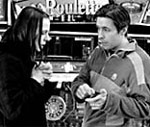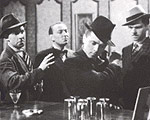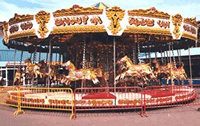|
| 1. A fable, of sorts
There was a girl I used to work with whose catchphrase was 'I just want to live by the sea'. Instead, she started an internet company and briefly became a paper millionaire. If she had sold up at the right time, she could have left it all behind and bought that house in Brighton. Instead, she stayed around to watch the value of her company plummet. There is a moral there somewhere, but I'm not quite sure what it is.
2. A lyric
'This would never happen if we lived by the sea.'
3. One very bad film
Circus probably wasn't the worst British film released in the last couple of years. Rancid Aluminium, Brothers, Dead Babies, Mad Cows, Final Cut and others I have blissfully forgotten could well be more vile. I once spent a long evening discussing the idea of booking somewhere like the Prince Charles off Leicester Square and having a festival of Bad British Movies. But Circus is a very bad movie, a hopelessly convoluted thriller would desperately like to be compared to Tarantino, complete with the so unhip-it-must-be-hip? casting of Christopher Biggins and Brian Conley. I can't even remember the plot, except that it involved lots of triple-crossing and camp villainy from Eddie Izzard and snarling villainy from Conley wearing a white suit.
Circus was set in Brighton, a bright shiny Brighton, a tourist's Brighton. There is even a chase scene that weaves through the Lanes. Another key scene takes place at the train station, a train station that a lingering shot on a sign tells us is 'Brighton'. For some reason, though, it was Hove Station. Do you reckon the producers imagined that the international audiences they were dreaming of would be confused by the word 'Hove'? |

| 4. Two good films
Last Resort is probably the best British film released in the last couple of years. You could make claims for Wonderland, Sexy Beast, most of Gangster No 1, but Pawel Pawlikowski's film has the edge because it has no flaws you have to explain away to yourself.
There are no saucy postcards in a Margate which has diplomatically been renamed Stonehaven for this story about a Russian single mother who accidentally claims refugee status in the UK. This is the British seaside town as a barbed wire-surrounded dumping ground for asylum seekers, a resort turned prison camp, with all its gaudy tattiness. Unlike most post-Ken Loach/Alan Clarke British realists, though, Pawlikowski (who arrived here aged 12) and his director of photography Rsyzard Lenczewski know that there can be beauty in the grubbiest of places. As much as I dislike the term, Last Resort is excellent at digging out the poetry of everyday life. In films like Nil By Mouth, you get the feeling that the skies over council estates must always be piss-streaked concrete grey to match the buildings. Pawlikowski and Lenczewski are smarter than that, and along with being warm and strange and revealing, Last Resort is a rather beautiful film.
The only recent film comparison point is I Want You, Michael Winterbottom's widely disliked film set in Hastings. Like Pawlikowski, Winterbottom has an eye for the eerie rather the banal in seaside towns. And like Last Resort, I Want You filters its view of England through the eyes of displaced Eastern Europeans. Maybe the distance is what we need. A lot of people really hated I Want You (incidentally, the seemingly bland title is transformed when you realise it comes from Elvis Costello's most sinister song). Most people I like liked it: it's not an easy film, and it has long passages with no dialogue, but it stays with you. And as Winterbottom showed with the terrific Wonderland, he is one of the few directors here grappling with finding a way of filming Britain in a way that doesn't make it look like The Bill or an ultraslick ad or a heritage poster designed for American consumption.
5. Incidentally
With Brighton prices out of control, the Financial Times suggest that the time is right to invest in property in Hastings. No, really.
6. Some old films
We've been here before. Last Resort hovers around Dreamland, the funfair shown in O Dreamland, Lindsay Anderson's 1953 documentary about Margate. The release of Last Resort coincided with a NFT season celebrating Free Cinema, the documentary movement that included Anderson, Tony Richardson and Karel Reisz. From Free Cinema sprang the British New Wave, films like Room At The Top, Saturday Night And Sunday Morning, This Sporting Life and A Kind Of Loving. I have a lot of time for these films: sure they can be over-obvious in places, and ring horribly false in others, but they are still enjoyable, and valuable. Morrissey, of course, loved them, and for all the wrong reasons. It seems to me he wanted to recreate the oppressive mood the characters in them feel trapped by. A Taste Of Honey ('I dreamt about you last night/And I fell out of bed twice') with its non-exotic black and openly gay characters, is actually a call for the end of the milky tea, suffocating England Morrissey was/is so drawn to. |

| The seaside is important in the British New Wave. In Room At The Top Laurence Harvey and Simone Signoret steal away a weekend at the sea, and stumble along a windlashed beach under pouring rain. It's all the more touching for the horrors of the weather. If I remember it right, Rita Tushingham gets dragged to a seafront funfair in A Taste Of Honey. And in The Loneliness Of The Long Distance Runner Tom Courteney and James Bolam sneak off to the beach and get a glimpse of freedom among the sand dunes, before Courteney ends up in borstal. In the days before everyone who could scrape together a couple hundred quid jetted off to Florida, the coast was all the British had to escape to. Now most of the south coast, Brighton excepted, serves as a place where we can lose the old, the unemployed, the foreign.
7. A new film
Late Night Shopping isn't a great film, but it's a decent one, filmed in Glasgow but set in a non-specified British city of all-night jobs at call centres or stacking supermarket shelves. Saul Metzstein, the director, argues that it's not really an American indie film set in Britain, but concedes that it is closer to American indie movies than anything being made here at the moment. Anyway, in the bit that happens in every urban set British film involving youngish characters, there's a bit where they leave town. And in this case, drive to a windswept seaside town with Crazy Golf and the kind of old-fashioned caff that people I know fetishise more and more. But then, this is a small country. Drive in a straight line towards three of the compass points and you'll hit the coast sooner rather than later. It's just we don't always know what to do when we get there.
8. What you shouldn't do when you get there:
Walk down the beach chanting 'We are the Mods, we are the Mods, we are we are we are the Mods.' Hero-worshipping Sting also not advised.
9. Blue Juice
Ewan McGregor, Catherine Zeta-Jones. Mid-90s. Cornish surfing movie. Tee-hee.
10. Do you think the mooks who made Circus have even seen Brighton Rock?
Which is everything their shoddy effort isn't: a genuinely menacing thriller with an exact sense of place.
11. A Cinema
Teignmouth, the Devon port and resort where my grandparents used to live and my parents still have a house, had a cinema called the Riviera. The snacks were terrible, the seats threadbare, there never used to be anybody in the audience, but the screen was big and it was only two quid in. It was a good place to hide on a rainy August day. The first film I remember seeing there was Moonraker, the last The Wedding Singer. Of course, they would never have shown a film like Last Resort, but it would have been smart if they had, no? Unfortunately, whoever owned the Riviera finally decided to cash in on their huge chunk of seafront property and shut the place down last year. That's the thing about seaside films in Britain these days: you'll never get to see them by the sea.
© Mark Morris
|


